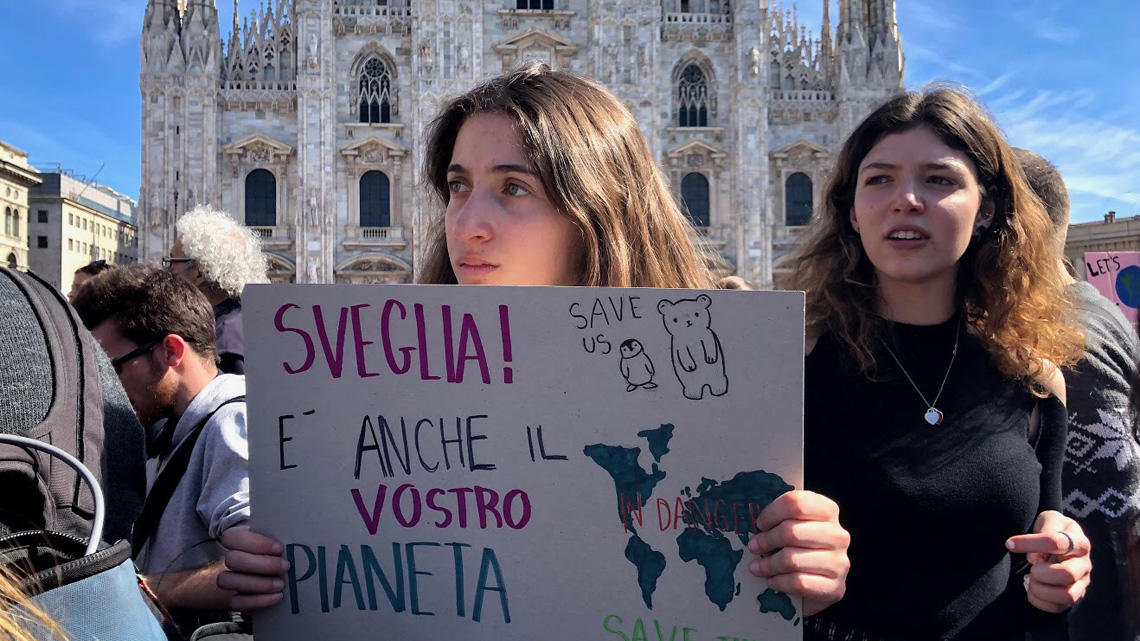Pubblicato il 22/05/2019 06:53:43
CANNES 2019
I professionisti del cinema a Cannes incoraggiano i cittadini a votare alle elezioni europee.
Le News di Cineuropa.
21/05/2019 - CANNES 2019: La Société des Réalisateurs de Films, European Film Academy, FERA e SAA uniscono le forze per lanciare un manifesto e un invito all'azione dal 23 al 26 maggio
Oggi, al 72° Festival di Cannes, i professionisti del cinema hanno partecipato alla presentazione di un manifesto per incoraggiare i cittadini a votare alle elezioni europee, che si svolgeranno tra pochi giorni, dal 23 al 26 maggio, in tutti gli Stati membri dell'Unione europea.
Redatto dalla Société des Réalisateurs de Films (SRF), organizzatrice della Quinzaine des Réalisateurs di Cannes, la European Film Academy (EFA), la Federation of European Film Directors (FERA) e la Society of Audiovisual Authors (SAA), il documento è un invito all’azione in quello che un momento decisivo per l’Unione europea.
La regista francese Céline Sciamma (che è anche in competizione per la Palma d'Oro di quest'anno con il suo nuovo film, Portrait de la jeune fille en feu), con il regista croata Hrvoje Hribar, alla presenza di diversi altri registi, ha letto il manifesto di fronte al Centre d'art La Malmaison, proprio accanto alle sedi principali del Festival di Cannes.
Gli 500 firmatari includono registi come Céline Sciamma, Wim Wenders, Agnieszka Holland, Miguel Gomes, Luc e Jean-Pierre Dardenne, Valeria Golino, Jacques Audiard, Susanne Bier, Pawel Pawlikowski, Julie Bertuccelli, Alan Parker, Costa-Gavras, Julie Delpy, Stephen Frears, Stellan Skarsgard, Ralph Fiennes, e molti altri.
Il manifesto:
L'Europa non è perfetta, è vero. A volte le rimproveriamo, e a ragione, di trascurare anima ed emozioni e di utilizzare una lingua che pochi di noi capiscono. Le rimproveriamo di non essere all'altezza delle crisi ecologiche, sociali e politiche che al giorno d’oggi l’attraversano, di non essere all'altezza del dramma dei rifugiati. Eppure, nonostante debolezze e fragilità, troviamo in essa anche umanità e bellezza. E ci sforziamo di descriverla con la delicatezza delle immagini e con un linguaggio più accessibile a tutte me genti che la compongono. E non dimentichiamo che l'Europa si è unita per la pace. Dai sei membri iniziali, si è allargata fino ad abbracciare 28 paesi, che formano un'unione unica e fonte di ispirazione per tutta l'umanità. Questa Unione si è fondata sul superamento delle frontiere, la libera circolazione, lo scambio, la fratellanza e la solidarietà, valori oggi minacciati da ogni parte, anche al suo interno. Ma questa è anche l'Unione della cultura, vera e propria ambizione per un'Europa in cui innovazione e creazione sono da sempre le colonne portanti. Un'Europa libera e democratica è anche un'Europa caratterizzata da libertà di pensiero e di espressione. È nostro dovere difenderla da estremismi e da mentalità retrograde, che tornano a diffondersi come la peste. Questo equilibrio così fragile, dobbiamo consolidarlo, migliorarlo, e opporci a quanti intendono indebolirlo con fratture e rinunce, cercando di sottrarvisi o di isolarsi. Alla domanda: come costruire un'Europa desiderabile, un'Europa in grado di riunire, un'Europa aperta che offra uno spazio di libertà e di pace? dobbiamo rispondere con l'impegno, guidando la lotta delle idee per evitare quella delle armi. Dal 23 al 26 maggio, in occasione delle elezioni europee, andremo a votare. È in gioco il nostro futuro comune, anzi il nostro stesso futuro.
LEGISLAZIONE Europa
I deputati europei approvano la riforma del copyright.
Articolo di Thierry Leclercq 27/03/2019 - Mettendo fine a più di due anni e mezzo di negoziati e di intensa lobbying, il Parlamento europeo ha approvato il 26 marzo a Strasburgo la direttiva che modernizza il diritto d'autore.
With 348 votes in favour of the text, 274 against and 36 abstentions, this directive is the product of an agreement reached between the European institutions at the end of their trialogue in mid-February. Its main aim is to strengthen the position of creators whose works are used by online platforms. All that remains is for the directive to be approved one last time by European ministers on 9 April – a mere formality –, after which member states will be granted two years to transpose the directive into national law.
The main change this law brings is to oblige online platforms to negotiate licensing agreements with the representatives of right holders; if the former don’t want to be held responsible for copyright infringements committed by their users, they will have to do everything in their power to prevent this scenario, either by obtaining the necessary authorisations or by withdrawing illegal content so as to prevent future breaches. For those opposed to the text, there aren’t many other options available to operators, other than installing an automatic content filter which will seriously limit freedom of expression online. The directive will, however, leave users free to share protected works in the context of quotations, criticism, opinion pieces, caricature, parody or pastiche. A further clause also allows greater flexibility for smaller platforms which are less than 3 years old, with under 5 million users per month and with a turnover below €10m.
So as to enhance the accessibility and visibility of European works on VOD platforms, the directive provides for a new negotiation mechanism which will ensure a more straightforward process for obtaining film and TV series exploitation licences. This will also apply to protected works which are no longer commercially available; institutions such as film libraries will be able to negotiate with collective rights management organisations or lay claim to copyright exceptions for uses relating to teaching, preservation or research. Under certain conditions, collective management organisations will also be permitted to conclude licencing agreements for right holders who are not members of their respective organisations.
Authors and creators will not only benefit from greater control over the online use of their content (films, music, articles...), but they will also be entitled to fair and proportionate remuneration; for their part, producers and editors will have to demonstrate transparency in their exploitation of works and allow authors and actors to receive a fair share of the proceeds. Creators should also be in a better position to (re)negotiate their contracts and to obtain redress where their rights are not respected.
According to German MEP Axel Voss (EPP, GE), who defended the initiative within the Assembly, "This deal is an important step towards correcting a situation which has allowed a few companies to earn huge sums of money without properly remunerating the thousands of creators and journalists whose work they depend on". For the Commission, "Today’s vote ensures the right balance between the interests of all players – users, creators, authors, press – while putting in place proportionate obligations on online platforms",declared commissioners Andrus Ansip and Mariya Gabriel. Creators (FERA, SAA, FSE), producers and film agencies (EFADs), meanwhile, believe the approval of this directive to be "a major victory for European authors".
LEGISLAZIONE Europa - Gli autori europei chiedono una remunerazione proporzionata nella direttiva sul diritto d'autore.
Articolo di Cineuropa 21/01/2019 - 95 registi europei hanno firmato una petizione che invita le leggi sul mercato unico digitale a rispondere in modo efficace alle loro esigenze finanziarie.
As the trilogue negotiations on the proposed Directive on Copyright in the European Union's Digital Single Market are drawing to a conclusion, European authors are making the most of their last opportunity to effectively ensure benefit from the economic success of their works. As announced by the Society of Audiovisual Authors (SAA), 95 European filmmakers have signed a petition asking for a principle of proportionate remuneration to be enshrined in the Copyright Directive.
The signatories fully support Article -14, which ensures they are to be fairly remunerated for the success of their works by establishing a fundamental principle of fair and proportionate remuneration for authors and performers in Europe. However, they have expressed their concern that it will have no positive effect in practice if the following elements are missing: an explicit reference to "proportionate" remuneration, since it is the only way for them to receive a fair reward for the success of their work by receiving a proper share of the revenues our works generate, a clear reference to the different collective mechanisms currently in place in various Member States in Art -14, i.e. collective bargaining agreements, collective management of rights and statutory remuneration mechanisms, and the need to make clear that lump-sums, while technically possible, should be the exception, given that the idea of a one-off payment contradicts the idea of proportionate remuneration and the prospect of claiming additional payment under Article 15.
Authors have expressed that as global distribution players are emerging in the EU audiovisual market, they are becoming painfully aware of the contrast of their situation with that of our US screenwriters and directors' colleagues, who are compensated for the distribution of their work worldwide. For this unlevel playing field, both within the Digital Single Market and worldwide, to come to an end, authors are calling on public support to strengthen the creative community so that they can keep on developing new creative visions at the heart of our flourishing creative industries, to grow Europe's cultural diversity in the digital era.
Signatories include well-known filmmakers such as Spain's Alejandro Amenábar, Icíar Bollaín and Isabel Coixet, Italy's Marco Bellocchio, France's Stéphane Brizé, Costa-Gavras and Bertrand Tavernier, Belgium's Jean-Pierre and Luc Dardenne and Jaco Van Dormael, Poland's Agnieszka Holland and Pawel Pawlikowski, Portugal's Miguel Gomes, Romania's Cristian Mungiu, Germany's Volker Schlöndorff and Bosnia-Herzegovina's Danis Tanović.
« indietro |
stampa |
invia ad un amico »
# 0 commenti: Leggi |
Commenta » |
commenta con il testo a fronte »
I testi, le immagini o i video pubblicati in questa pagina, laddove non facciano parte dei contenuti o del layout grafico gestiti direttamente da LaRecherche.it, sono da considerarsi pubblicati direttamente dall'autore Giorgio Mancinelli, dunque senza un filtro diretto della Redazione, che comunque esercita un controllo, ma qualcosa può sfuggire, pertanto, qualora si ravvisassero attribuzioni non corrette di Opere o violazioni del diritto d'autore si invita a contattare direttamente la Redazione a questa e-mail: redazione@larecherche.it, indicando chiaramente la questione e riportando il collegamento a questa medesima pagina. Si ringrazia per la collaborazione.
|


